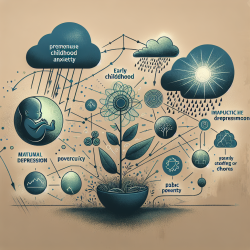The journey of a prematurely born child is fraught with unique challenges. Recent research by Weiss and Leung (2021) highlights the significant impact of maternal depressive symptoms, poverty, and young motherhood on the mental health of these children. Their findings underscore the importance of early intervention and support for both children and their mothers.
The Research Findings
The study involved 105 mothers and their infants recruited from two neonatal intensive care units. It revealed that 15% of the children met criteria for an anxiety disorder, while another 15% were diagnosed with depression by age two. The research identified three critical factors that increased these risks:
- Maternal Depressive Symptoms: Children whose mothers exhibited depressive symptoms were more likely to develop both anxiety and depression.
- Poverty: Living in poverty was strongly associated with an increased risk of depressive disorders in children.
- Young Motherhood: Children born to young mothers showed a higher propensity for anxiety disorders.
Implications for Practitioners
The findings emphasize the need for practitioners to adopt a holistic approach when working with families of prematurely born children. Here are some strategies to consider:
- Mental Health Assessment: Initiate regular mental health assessments for prematurely born children during their first two years to identify early signs of anxiety or depression.
- Maternal Support Programs: Develop programs that provide emotional and practical support to mothers experiencing depression, especially those living in poverty or who are young parents.
- Counseling Services: Offer counseling services tailored to address the unique challenges faced by young mothers, helping them navigate their developmental tasks while supporting their child's needs.
The Path Forward
This research serves as a call to action for further exploration into the mechanisms linking maternal depression and socio-economic factors with childhood mental health issues. Practitioners are encouraged to delve deeper into these areas to enhance their understanding and improve intervention strategies.










